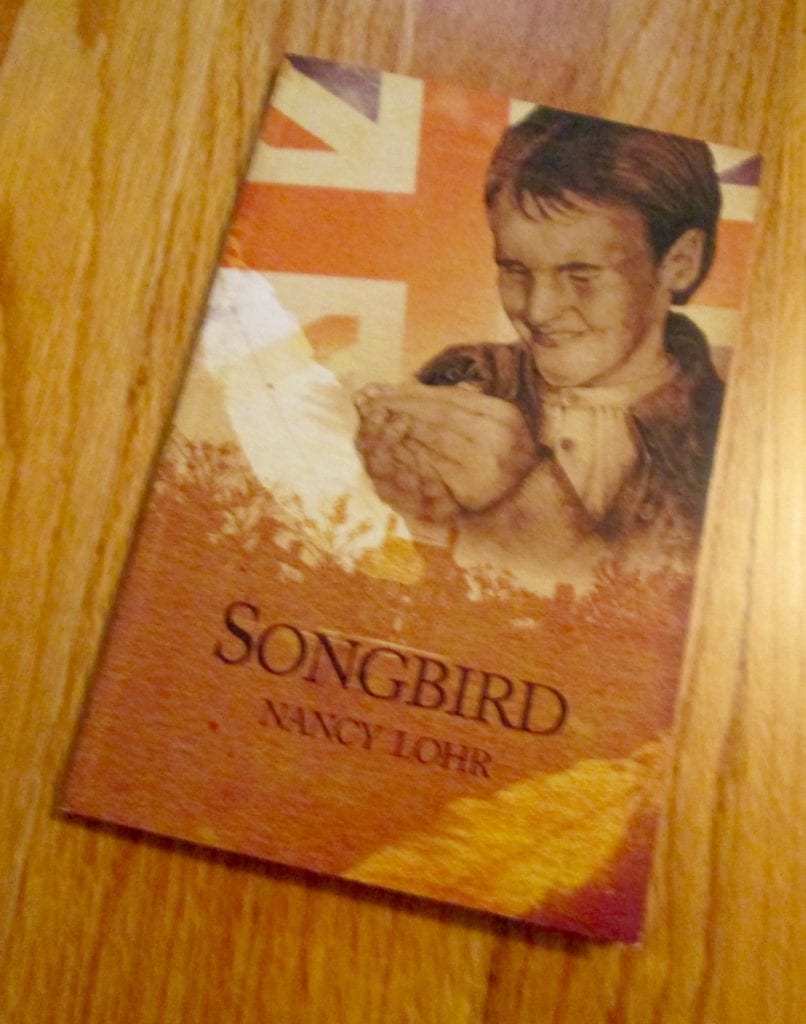
Last week I reviewed a book from Nancy Lohr for boys ages 7-9. This week’s book review is for boys ages 9-12, and the time period takes us back to 1768-1770.
The book titled, Songbird, is the story of a boy whose father is considered to be a “lower-class laboring” man who owns a Foundry that makes pewter housewares.
The hero of the story is Truxton. He has a gift for healing and uses it on birds with broken wings and burns that result from dealing with hot metal in the Foundry.
Nancy Lohr gives words to know at the beginning of the book, which are helpful to understand the time period. We don’t hear words like this today. Some of the words I found interesting were:
gaol – a prison where a guilty person awaited his judgment
Psalter – a small book containing David’s Psalms written in poetic form
shire reeve – an officer who enforced the law
unguent – a soothing ointment (see list of Terms after Contents page for more)
In reading this book, you will be learning about song birds that we don’t hear of today, the history behind how they prosecuted cases in colonial Williamsburg, and the strong faith of the working class that brought them to America.
In this story there is no mention of a Bible. At the end of the book, on pages 65-66, Nancy gives more details of this historical time period. She says, “Books were very expensive at this time, so they were owned primarily by the gentry….It would not have been unusual for a family like Truxton’s to own only one book.” This fictional family read a portion from the Psalter at each meal, when help and wisdom were needed, and in times of crisis. The father’s dedication to reading this book was noteworthy as he was able to quote from it during a stressful time. It was also noted that the mother prayed immediately when faced with a decision she had to make. This family used what they had to develop and instill faith in themselves and their children.
Lest I give the story away, I will only tell you of the choices of punishments used during this time period if a person caused someone to be maimed. They could be sent away from their family and the colony for the rest of their lives. They could be hanged. Or, they could request “the benefit of clergy… for certain serious crimes. If the person could prove in court the ability to read, he could claim the benefit one time. The fleshy part of the left thumb was branded with an ‘M’ for murder and a ‘T’ for other felonies. This was apparently an old law that came from the time when people who could read were very uncommon and therefore valuable.” (page 66)
One other aspect of the book that I will comment on is the Bible verses that are quoted. They are the Psalms of David in meter. I had to google that as I didn’t know what it meant. This definition comes from The Psalms in Common Meter – Kindle edition by D. Scott Foote…”This metrical form is of the pattern in which each verse is converted into four lines of syllable count 8-6-8-6, with a rhyme on the last syllable of the second and fourth lines.”
Two verses quoted in the book reversed words and I, at first, thought they were typos, then realized it could be the conversion to metrical form to create the rhyme on the second and fourth lines.
On the dedication page the verse says:
“In chariots some put confidence, some horses trust upon: But we remember will the name of our Lord God alone. Psalm 20:7 from the Psalms of David in metre“
On page 54 a verse from Psalm Fifty-one is read as:
“Me cleanse from sin, and throughly wash from mine iniquity: For my transgressions I confess; my sin I ever see.”
I found it very interesting to hear the cadence as you read each verse where the words are positioned to make rhymes and can be sung.
Nancy Lohr has a gift for whetting the appetite to learn more about history, meter, and books of the period. I highly recommend this book for boys ages 9-12, and for anyone who loves history. I learned so much rich history from the book, the importance of turning to God in prayer and His word throughout the day, and the importance of being able to read during that time, just like the importance of being able to read today. So much hinges on getting our children reading at an early age, then and now.
Did you find the information on the Psalms written in meter helpful? Does the reversal of the words “remember will” in Psalm 20:7 and “Me cleanse” in the Psalm Fifty-one verse make you think they are typos or the “metre” (spelling for time period)? I couldn’t find them written like this in the resources I checked online. I would love to hear from you on this subject. Also, if you go to D. Scott Foote’s book on Amazon, you will find Psalm 1 written in meter as an example. It was very exciting to me to read these verses in meter, and I hope you enjoy them, also.
